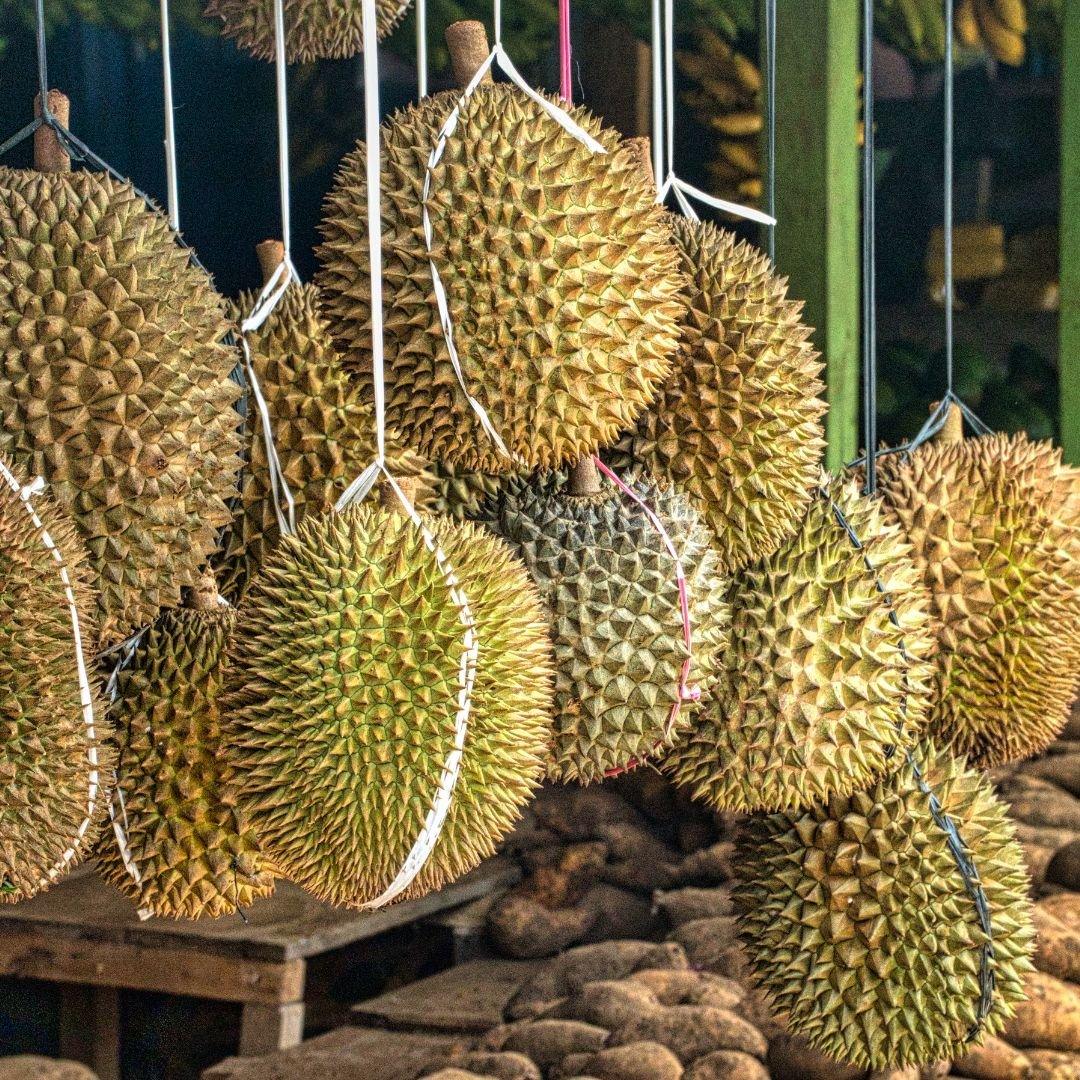
Durian: The Controversial King of Fruits
Share
In the vast world of exotic fruits, few can claim a reputation as polarising as the durian. Often hailed as the "King of Fruits" in Southeast Asia, this spiky, pungent delicacy has been known to evoke strong reactions from both admirers and detractors alike. Today, we're diving deep into the world of durian, exploring its unique characteristics, cultural significance, and why it's worth giving this controversial fruit a chance.
What is Durian?
Durian is a large, spiky fruit native to Southeast Asia, particularly Malaysia, Indonesia, and Thailand. The name "durian" comes from the Malay word "duri," meaning thorn, a nod to its formidable exterior. Beneath this thorny shell lies creamy, custard-like flesh with a complex flavour profile that has been described as everything from "heavenly" to "utterly repulsive."
The Signature Scent
Let's address the elephant in the room – the smell. Durian is infamous for its potent odour, often compared to rotting onions, turpentine, and raw sewage. This smell is so strong that the fruit is banned in many hotels and public transportation systems across Southeast Asia. However, fans of the fruit argue that this pungent aroma is part of its charm and a prelude to its unique taste.
Taste: A Complex Flavour Profile
For those brave enough to get past the smell, durian offers a flavour experience like no other. Its taste is often described as a mix of sweet and savoury, with notes of almond, caramel, and vanilla, coupled with a hint of onion. The creamy texture adds to the sensory experience, making it a true delicacy for its fans.

Global Popularity and Cultural Significance
While durian is native to Southeast Asia, its popularity has spread to various parts of the world. Let's explore where this fruit is most beloved and its cultural importance:
Southeast Asia: The Heartland of Durian
Malaysia: Often considered the unofficial national fruit, durian is a source of national pride. The most prized variety, Musang King, hails from here. Durian season is celebrated with festivals and special events.
Thailand: The world's largest exporter of durian, Thailand has numerous cultivars. The fruit is so beloved that there's a saying: "Don't judge a durian by its smell." Bangkok hosts an annual durian festival.
Indonesia: Particularly popular on the islands of Sumatra and Borneo. The city of Medan is famous for its high-quality durians.
Singapore: Despite being a urban city-state, Singapore has a robust durian culture. The fruit often appears in local desserts and is celebrated in seasonal "durian buffets."
Philippines: While not as widespread, durian is popular in the southern regions, particularly Davao, which hosts an annual Kadayawan Festival celebrating durian and other fruits.
Beyond Southeast Asia
China: The largest importer of durian, with demand growing rapidly. The fruit is seen as a luxury item and is often given as a prestigious gift.
Japan: There's a niche but dedicated durian fanbase. Some regions have even attempted to grow durian domestically.
Australia: Northern territories grow durian, and it's gaining popularity among adventurous food lovers in major cities.
Cultural Representations
Durian's cultural significance extends beyond mere consumption:
-
Symbol of Southeast Asian Identity: For many, durian represents a connection to their cultural roots and a point of national or regional pride.
-
Art and Literature: The fruit frequently appears in Southeast Asian art, literature, and folklore. In Malaysia, there's even a popular saying: "When the durians fall, the sarongs go up," hinting at the fruit's reputation as an aphrodisiac.
-
Architecture: The iconic shape of durian has inspired architectural designs, most famously the Esplanade theatre in Singapore, affectionately known as "The Durian" due to its spiky exterior.
-
Traditional Medicine: In some cultures, various parts of the durian tree, including the fruit, leaves, and roots, are used in traditional medicine to treat fever, jaundice, and skin conditions.
-
Social Bonding: Durian-eating is often a social activity, bringing friends and family together. In many Southeast Asian countries, it's common to see groups gathering around durian stalls, sharing the fruit and conversation.
-
Economic Importance: For many communities, particularly in rural areas of Southeast Asia, durian cultivation is a significant source of income and employment.
-
Culinary Innovation: Beyond eating the fruit fresh, durian has inspired countless culinary creations, from traditional desserts like Thai sticky rice with durian to modern interpretations like durian pizza and durian coffee.
Nutritional Value
Despite its reputation, durian is actually quite nutritious. It's rich in vitamins, minerals, and healthy fats. Some key nutrients include:
-
Vitamin C: Boosts immune system
-
Potassium: Supports heart health
-
Healthy fats: Good for skin and heart health
-
Fibre: Aids digestion
However, it's also high in calories and sugar, so moderation is key.

How to Choose and Enjoy Durian
If you're feeling adventurous and want to try durian, here are a few tips:
-
Choose a fruit that gives slightly when pressed and has a strong aroma at the stem.
-
Look for a fruit with an even colour and no blemishes.
-
If you're new to durian, try it in a well-ventilated area or outdoors.
-
Start with a small amount to acquaint yourself with the flavour.
-
Consider trying durian-flavoured products like ice cream or candy as a gentler introduction.
Love it or hate it, durian is undeniably one of the most fascinating fruits in the world. Its complex flavour, cultural significance, and nutritional benefits make it a true wonder of nature. While it may not be for everyone, we encourage our adventurous readers to give this "King of Fruits" a try. You might just find yourself joining the ranks of durian enthusiasts worldwide!
Stay tuned for more explorations of exotic fruits and exciting culinary discoveries from around the globe. Next time, we'll be venturing into the vibrant world of West African cuisine – another treasure trove of unique flavours and ingredients waiting to be unveiled!
From the Epicerie with love
